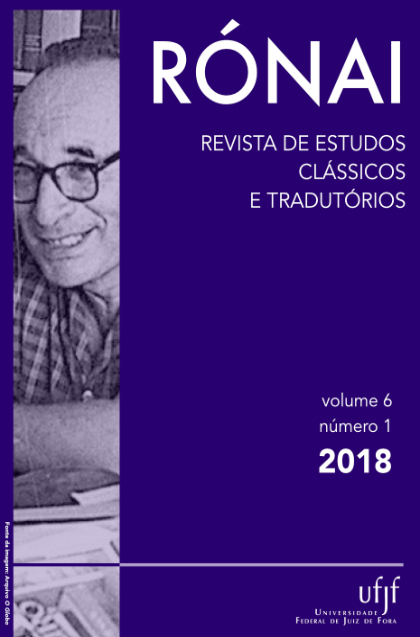The reception and reworking of some principles of classical poetics in Lope de Vega's Arte nuevo de hacer comedias en este tiempo
DOI:
https://doi.org/10.34019/2318-3446.2018.v6.23255Keywords:
Poetics, reception, classical tradition, Lope de VegaAbstract
This paper analyses the reception of Aristotle’s Poetics and Horace’s The Art of Poetry in Lope de Vega’s Arte nuevo de hacer comedias en este tiempo by a close reading of selected verses from the latter. By so doing, we hope to better understand how Lope reworks the ancient principles into his new treatise.
Downloads
References
ARISTÓTELES. Poética. Trad., comen. Eudoro de Souza. São Paulo: Abril Cultural, 1984.
ARISTÓTELES. Retórica. Pref., intr.., Manuel Alexandre Júnior/ Trad., not., Manuel Alexandre Júnior, Paulo Farmhouse Alberto e Abel do Nascimento Pena. São Paulo: WMF Martins Fontes, 2012.
CARVALHO, M. S. F. de. Imitação, linguagem e agudeza. In: —. Poesia de agudeza em Portugal: estudo retórico da poesia lírica e satírica escrita em Portugal no século XVII. São Paulo: Humanitas Editorial, EDUSP, FAPESP, 2007.
CARVALLO, L. A. de. Cisne de Apolo: de las excelencias y dignidad y todo lo que al arte poética y versificatoria pertenece. Medina del Campo: Juan Godinez de Miilis, 1602. Biblioteca Virtual del Principado de Asturias. Disponível em: <https://bibliotecavirtual.asturias.es/i18n/consulta/registro.cmd?id=669>. Acesso em: 24 mar. 2018.
CASCALES, F. Tablas poéticas. London: Classic Reprint Series, Forgotten Books, 2015.
CERVANTES, M. de. Prólogo al lector. In: —. Ocho comedias y ocho entremeses nuevos, nunca representados. Ed. Florencio Sevilla Arroyo. Alicante: Biblioteca Virtual Miguel de Cervantes, 2001a. Disponível em: <http://www.cervantesvirtual.com/obra-visor/ocho-comedias-y-ocho-entremeses-nuevos-nunca-representados--0/html/> Acesso em 23 mar. 2018.
__. El rufián dichoso. Ed. Florencio Sevilla Arroyo. Alicante: Biblioteca Virtual Miguel de Cervantes, 2001b. Disponível em: http://www.cervantesvirtual.com/obra/el-rufian-dichoso--0/>. Acesso em 23 mar. 2018.
CUEVA, J. de la. Exemplar poético. Ed. Jose Maria Reyes Cano. Sevilla: Alfar, 1986.
CUNHA, N. Uma era de esplendor. In: GUINSBURG, Jacob; CUNHA, Newton (org.). Teatro espanhol do século de ouro. São Paulo: Perspectiva, 2012.
DÍEZ-BORQUE. J. M. Lope de Vega y los gustos del ‘vulgo’. Teatro: Revista de Estudios Culturales/ A Journal of Cultural Studies, Alcalá, n. 1, p. 7-32, 1992. Disponível em: <https://dialnet.unirioja.es/servlet/articulo?codigo=170507>. Acesso em 24 mar. 2018.
GARCÍA SANTO-TOMÁS, E. Introdução. In: VEGA, Lope. Arte nuevo de hacer comedias. Madrid: Cátedra, 2012.
HANSEN, J. A. Barroco, neobarroco e outras ruínas. In: Floema. Caderno de Teoria e História Literária, Ano II, n. 2A, 2006.
HORÁCIO. Arte poética. Intr., trad. e com. Raúl Miguel Rosado Fernandes. Lisboa: Mem Martins: Inquérito, 1984.
LOPE DE VEGA, F. Arte nuevo de hacer comedias. Ed. Enrique García Santo-Tomás. Madrid: Cátedra/ Letras Hispánicas, 2012.
MAESTRO, J. G. Principios de preceptiva teatral del siglo XVII desde el materialismo filosófico como teoria de la literatura. In: ARELLANO, Ignacio; BLECUA, Alberto; SERÉS, Guillermo (org). El teatro del siglo de oro: edición y interpretación. Madrid: Biblioteca Áurea Hispânica, v. 61, 2009.
MENÉNDEZ- PELAYO, M. Historia de las ideas estéticas en España: siglos XVI, XVII. Ed. Enrique Sánchez Reyes. Alicante: Biblioteca Virtual Miguel de Cervantes, 2008. Disponível em: <http://www.cervantesvirtual.com/obra/historia-de-las-ideas-esteticas-en-espana-siglosxvi-y-xvii--0/ > Acesso em: 23 mar. 2018.
MUHANA, A. A epopeia em prosa seiscentista. São Paulo: Fundação Editora da Unesp, 1997.
PEDRAZA-JIMÉNEZ, F. B. Rimas (segunda parte). Universidad de Castilla/ La Mancha Servicio de Publicaciones, 1994.
PINCIANO, A. L. Philosophia antigua poética. Ed. Jose Rico Verdú. Madrid: Biblioteca Castro, 1998.
RODRIGUEZ, I. L. F. A Poética X El Arte nuevo. In: —. Acis y galatea: convenções e representações políticas na zarzuela de Cañizares- Literes. Dissertação (mestrado) – Departamento de Artes do Setor de Ciências Humanas, Letras e Artes, Universidade Federal do Paraná. Curitiba, 2013.
ROMEO, S. M. Lope de Vega y el Arte nuevo de hacer comedias en este tiempo: su contexto y influencias. Revista Letra Digital (2012). Disponível em: <http://www.letraspuc.cl/index.php?option=com_content&view=article&id=1228:lope-devega-y-el-arte-nuevo-de-hacer-comedias-en-este-tiempo-su-contextoeinfluencias&catid=81:publicaciones&Itemid=458>. Acesso em 23 mar. 2018.
ROZAS, J. M. Significado y doctrina del Arte nuevo de Lope de Vega. Alicante: Biblioteca Virtual Miguel de Cervantes, 2002. Disponível em: <http://www.cervantesvirtual.com/obra/significado-y-doctrina-del-arte-nuevo-de-lope-de-vega-0/>. Acesso em 23 mar. 2018.
SOUZA, A.A.T. de. Teatro na Espanha de Lope de Vega. In: —. Artifícios engenhosos dos loucos fingidos no teatro de Lope de Vega. Tese (doutorado) – Faculdade de Filosofia, Letras e Ciências Humanas, Universidade de São Paulo. São Paulo, 2015.
Downloads
Published
How to Cite
Issue
Section
License
Copyright (c) 2018 Gabriel Furine Contatori, Érico Nogueira

This work is licensed under a Creative Commons Attribution 4.0 International License.
Copyright
The authors of the published contributions agree with the following items:
1. The authors keep the copyright and convey to the journal the right of first publication, the work being licensed under a Creative Commons Attribution License 4.0 International.
2. The authors are allowed and stimulated to publicize and distribute their work online after the publication in the journal, recognizing first publication in this journal.
3. The authors of the approved works authorize the journal to distribute their content, after publication, for reproduction in content indexes, virtual libraries and similars.
For more information about Creative Commons Attribution License 4.0 International, please, go to: https://creativecommons.org/licenses/by/4.0/deed.en
Editorial exemption
The authors of the published contributions are entirely and exclusively responsible for their contents. Its content does not represent an official position of Rónai - Revista de Estudos Clássicos e Tradutórios neither of Faculdade de Letras da Universidade Federal de Juiz de Fora or their partner institutions.



